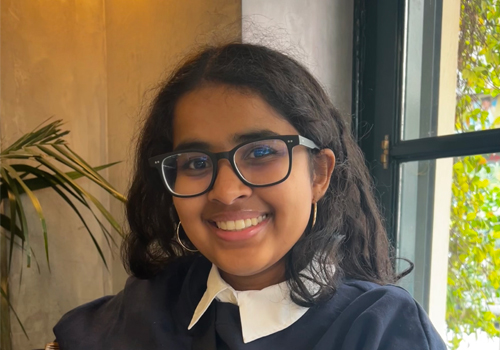“It was one of the best experiences of my life,” says Henry Yang about his trip to Greece earlier this year. The week-long visit was for the International Course Module (ICM) component of his Global Health Research course.
The third-year Human Biology Program course explores current global health issues and teaches students how to design and conduct a global health research study.
ICMs are offered by the Faculty of Arts & Science as opportunities for students to enhance their course experience through international, immersive and experiential learning. The global health ICM provided students with a chance to examine health issues experienced by migrants, refugees and asylum seekers entering Europe via Greece.
“Being there on the ground in Athens, talking to people from NGOs face-to-face, seeing what refugees had to do to get by every day — it was life changing and really altered my perspective,” says Yang, a global health major with minors in sociology and sexual diversity studies, and a member of New College.
The goal of this year's ICM was to take the first step in a multi-year, global health research project being conducted by Maria Papaconstantinou, an associate professor, teaching stream, in the Faculty of Arts & Science’s Human Biology Program; and Helen Dimaras, an associate professor and global health geneticist in the Faculty of Medicine and the Dalla Lana School of Public Health.

The long-term project will examine how NGOs in Athens plan and put into practice the social integration of refugees, asylum seekers and migrants. It will also look at how health outcomes are affected by an individual's status in a new country, by their gender, race, age and language barriers — as well as by Greece’s own economic struggles.
“Once you come up with a good global health research question like ours, you then have to decide what research methods you're going to use,” says Papaconstantinou, who led the ICM with Demaras. “Who are the stakeholders? Are you going to conduct qualitative interviews? What are the questions to ask?”
On this trip, the goal of Yang and the nine other ICM students was to address those questions and develop a guide for researchers to use when interviewing refugees in the future.
“We asked people at different NGOs if our questions for refugees made sense and were relevant, and whether they were culturally sensitive,” says Sharanya Shankar, a fourth-year student in a global health specialist program with a minor in physiology, and a member of Trinity College.
“For example, one of the first questions we looked at was: How did you get to Greece? What circumstances led you to be here?” she says. “Some of the experts we consulted thought it was a useful question. But others were of the opinion that it could re-traumatize an individual. It could make them feel like they were being interrogating all over again.
“That type of question made us realize how important it is to take this first step of developing an interview guide before actually conducting interviews with refugees,” she says.
So, while the ICM helped students gain a greater understanding of the issues, it also helped them identify organizations with whom to partner in order to conduct the study.
“For me, it really highlighted how important it is to collaborate genuinely with partners,” says Shankar. “It made me realize we can’t just sit here in Toronto and come up with all these questions to ask refugees that we think are good and then just go to Greece to interview people.
“At the end of the day, we can’t understand the experiences of refugees, as well as the people who actually work with these communities,” she says. “So it was very humbling to learn from these organizations. It’s through authentic partnering that you do meaningful research, by actually going there and being a part of it.”

For the course instructors, the ICMs contribute to their research while providing students with invaluable in-the-field, hands-on experience.
“ICMs help students learn and hone valuable skills,” says Papaconstantinou. “Written and verbal skills, critical and analytical thinking, organizational skills — because they’re the ones organizing the interviews, not us — and leadership skills. If you’re thinking about a career in research, you need these skills.”
“It was really nice to see the students’ growth from day one to day five,” adds Dimaras. “We could see their confidence and understanding grow. It was a short period — only a week — but by the end, they’d really grown into investigators.”
The students also enjoyed the usual extracurricular benefits of an ICM: bonding with their professors and fellow students, and experiencing local culture and visiting sites like the Acropolis.
“ICMs are a unique opportunity for students,” says Shankar. “You’re not just visiting a different country; you’re participating in a global health research project. You're learning so much from all the different organizations there.”
“There's a special energy about traveling with a purpose that’s different from traveling for leisure,” says Yang about his ICM experience. “I would love to do a trip like this again. I’m very thankful that ICM opportunities exist and I highly recommend students look into them.”

